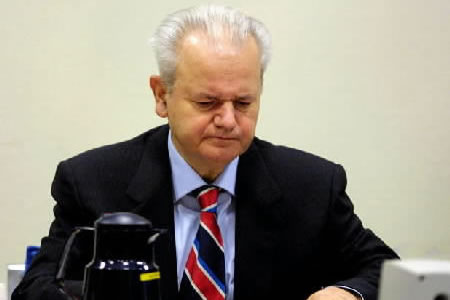Home
PROSECUTION: ENOUGH EVIDENCE OF MILOSEVIC'S RESPONSIBILITY FOR GENOCIDE IN BH
In their response to the brief filed by the amici curiae seeking that the counts charging Slobodan Milosevic with genocide and complicity in genocide be dropped from the Bosnia and Herzegovina indictment, prosecutors stress that the "genocidal intent" of the accused has been proven by his words and deeds. The prosecution admits, however, that it failed to prove allegations in the indictment relating to the second Markale market massacre in August 1995 and some other shelling incidents
 Slobodan Milosevic in the courtroom
Slobodan Milosevic in the courtroom The redacted, public version of the brief filed by prosecutors in response to the one submitted by the amici curiae was made public today in The Hague. The brief was originally filed more than a month ago. The Trial Chamber had invited the amici to file their brief at the end of the prosecution’s case in the Milosevic trial.
As a reminder, the brief requested that counts 1 and 2 from the Bosnia and Herzegovina indictment be dropped. In them, Milosevic is charged with genocide and complicity in genocide. Skirting the issue of whether genocide was committed in Bosnia or not, the amici curia limit themselves to claiming that at this stage in the proceedings, it has not been proven that Milosevic acted with a specific intent to "destroy [an ethnic or religious group] as such, in whole or in part," which is a requirement for a genocide conviction.
In its voluminous 220-plus-page response, the prosecution claims it presented enough evidence that Milosevic acted with the intent to destroy Bosnian Muslims in those parts of BH territory that were to be annexed to the Serbian state. The intent, in the view of the prosecution, is apparent in the "pattern of destructive and discriminatory actions" used against the Muslim population in the course of war in BH and in the "words and deeds" of the accused himself and other participants in the joint criminal enterprise. In the view of the prosecution, some of them – such as Radovan Karadzic and Ratko Mladic – did not even try to hide their intent to commit genocide.
The prosecution brief states that Milosevic "skillfully exploited the potentials of the nationalist ideology" and used the media under his control to create "conditions for the commission of genocidal crimes against Bosnian Muslims." One of the ways in which he did this was the "endless repetition of the idea that Serbs are at risk of another genocide," which, according to the prosecution, is "a not too subtle way to justify in advance the genocide to be committed against Muslims." The way in which Milosevic participated in the joint criminal enterprise, the prosecution concludes, "indicates that the accused shared the genocidal intent with Mladic, Karadzic and other Bosnian Serb leaders."
The prosecution admits that due to time constraints in presenting its case, it failed to prove beyond reasonable doubt every single incident in the Kosovo, Croatia and Bosnia and Herzegovina indictments. Among the incidents that have been left unproven is the second Markale market massacre in late August 1995.
The Trial Chamber will rule on the amici curiae brief and the prosecution response after their new member, British judge Lord Bonomy, formally makes the solemn declaration and signs a "certificate" confirming that he is fully acquainted with the Slobodan Milosevic case.
Linked Reports
- Case : Milosevic Slobodan - "Kosovo, Croatia and Bosnia"
- 2004-04-15 BATTLE FOR TIME AND WITNESSES
- 2004-04-14 LORD BONOMY TO REPLACE JUDGE MAY
- 2004-03-25 MILOŠEVIĆ REFUSES TO GIVE HIS CONSENT TO THE REPLACEMENT JUDGE
- 2004-05-27 MILOSEVIC'S RETURN TO COURTROOM POSTPONED AGAIN
- 2004-06-16 MILOSEVIC'S GENOCIDE CHARGES FOR BOSNIA REMAIN
- 2004-06-17 MILOSEVIC WILL HAVE TO WRITE, IF HE WANTS CLINTON AND BLAIR
